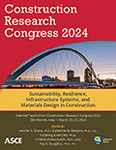Spatiotemporal Insights into Online Public Responses to Disasters in Developed and Underdeveloped Countries
Publication: Construction Research Congress 2024
ABSTRACT
Early-warnings and situational awareness during disasters are critical for protecting our built environments and communities. In recent years, the increasing prevalence of social media platforms has presented an unprecedented opportunity for gathering real-time information, facilitating rapid hazard detection, evacuation plan propagation, and damage assessment and recovery. However, underdeveloped countries have been inadequately explored compared with developed countries across different spatiotemporal scales. To address this knowledge gap, this study investigated online public responses before, during, and after two recent hurricanes, aiming to identify the different patterns between underdeveloped and developed countries at different stages of disasters. Twitter data of Hurricane Eta in Honduras and Nicaragua and Hurricane Ian in the US was collected and analyzed using sentiment analysis and topic modeling. The findings revealed that individuals in Honduras and Nicaragua tended to express more negative attitudes and had more concerns about disaster damage than those in the US. Sentiment differences were also found between moderately and mostly affected regions in the US. Recommendations for future research directions and disaster response practices were proposed based on the findings.
Get full access to this article
View all available purchase options and get full access to this chapter.
REFERENCES
Amraouy, M., M. Bellafkih, A. Bennane, and J. Talaghzi. 2023. “Sentiment Analysis for Competence-Based e-Assessment Using Machine Learning and Lexicon Approach.” In Proc., 3rd Int. Conf. on Artificial Intelligence and Computer Vision, Switzerland: Springer, Cham, 327–336.
Bucci, L., L. Alaka, A. Hagen, S. Delgado, and J. Beven. 2022. Hurricane Ian, Miami, FL: National Hurricane Center.
FEMA. 2023. “Designated Areas: Disaster 4673” Accessed April 12, 2023. https://www.fema.gov/disaster/4673/designated-areas.
Karami, A., V. Shah, R. Vaezi, and A. Bansal. 2020. “Twitter speaks: A case of national disaster situational awareness.” J. Inf. Sci. 46(3): 313–324.
Karimiziarani, M., K. Jafarzadegan, P. Abbaszadeh, W. Shao, and H. Moradkhani. 2022. “Hazard risk awareness and disaster management: Extracting the information content of twitter data.” Sustainable Cities Soc. 77: 103577.
Kontokosta, C. E., and A. Malik. 2018. “The Resilience to Emergencies and Disasters Index: Applying big data to benchmark and validate neighborhood resilience capacity.” Sustainable Cities Soc. 36: 272–285.
Kuruppu, N., and R. Willie. 2015. “Barriers to reducing climate enhanced disaster risks in Least Developed Country-Small Islands through anticipatory adaptation.” Weather Clim. Extremes, 7: 72–83.
Laituri, M., and K. Kodrich. 2008. “On line disaster response community: People as sensors of high magnitude disasters using internet GIS.” Sens. 8(5): 3037–3055.
Martín, Y., Z. Li, and S. L. Cutter. 2017. “Leveraging Twitter to gauge evacuation compliance: Spatiotemporal analysis of Hurricane Matthew.” PLoS one, 12(7): e0181701.
Pourebrahim, N., S. Sultana, J. Edwards, A. Gochanour, and S. Mohanty. 2019. “Understanding communication dynamics on Twitter during natural disasters: A case study of Hurricane Sandy.” Int. J. Disaster Risk Reduct. 37: 101176.
Pu, X., R. Jin, G. Wu, D. Han, and G. R. Xue. 2015. “Topic modeling in semantic space with keywords.” In Proc. 24th ACM Int. Conf. Information and Knowledge Management, 1141–1150.
Reynard, D., and M. Shirgaokar. 2019. “Harnessing the power of machine learning: Can Twitter data be useful in guiding resource allocation decisions during a natural disaster?” Transp. Res. Part D: Transp. Environ. 77: 449–463.
Setzmann, A. 2023. Distrust in governmental institutions: A comparative analysis of user-generated Twitter posts on climate change and COVID-19. B.S. thesis, Enschede, Netherlands: Univ. of Twente.
Taylor, H. T., B. Ward, M. Willis, and W. Zaleski. 2010. The saffir-simpson hurricane wind scale. Washington, DC: Atmospheric Administration.
Yuan, F., M. Li, R. Liu, W. Zhai, and B. Qi. 2021. “Social media for enhanced understanding of disaster resilience during Hurricane Florence.” Int. J. Inf. Manag, 57: 102289.
Zhou, S., P. Kan, Q. Huang, and J. Silbernagel. 2023. “A guided latent Dirichlet allocation approach to investigate real-time latent topics of Twitter data during Hurricane Laura.” J. Inf. Sci. 49(2): 465–479.
Zook, M., M. Graham, T. Shelton, and S. Gorman. 2010. “Volunteered geographic information and crowdsourcing disaster relief: a case study of the Haitian earthquake.” World Med. Health Policy 2(2): 7–33.
Zou, L., D. Liao, N. S. Lam, M. A. Meyer, N. G. Gharaibeh, H. Cai, B. Zhou, and D. Li. 2023. “Social media for emergency rescue: An analysis of rescue requests on Twitter during Hurricane Harvey.” Int. J. Disaster Risk Reduct. 85: 103513.
Information & Authors
Information
Published In
History
Published online: Mar 18, 2024
Authors
Metrics & Citations
Metrics
Citations
Download citation
If you have the appropriate software installed, you can download article citation data to the citation manager of your choice. Simply select your manager software from the list below and click Download.
